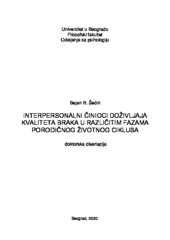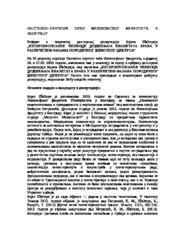Приказ основних података о дисертацији
Interpersonalni činioci doživljaja kvaliteta braka u različitim fazama porodičnog životnog ciklusa
Interpersonal factors of experience of marital quality in different stages of the family life cycle
| dc.contributor.advisor | Petrović, Nikola | |
| dc.contributor.other | Petrović, Nebojša | |
| dc.contributor.other | Bobić, Mirjana | |
| dc.contributor.other | Tenjović, Lazar | |
| dc.creator | Šaćiri, Bejan | |
| dc.date.accessioned | 2020-11-16T15:12:54Z | |
| dc.date.available | 2020-11-16T15:12:54Z | |
| dc.date.issued | 2020-09-07 | |
| dc.identifier.uri | http://eteze.bg.ac.rs/application/showtheses?thesesId=7735 | |
| dc.identifier.uri | https://fedorabg.bg.ac.rs/fedora/get/o:22961/bdef:Content/download | |
| dc.identifier.uri | http://vbs.rs/scripts/cobiss?command=DISPLAY&base=70036&RID=24138249 | |
| dc.identifier.uri | https://nardus.mpn.gov.rs/handle/123456789/17658 | |
| dc.description.abstract | Tema ovog rada je doţivljaj kvaliteta braka koja je jedna od središnjih tema u prouĉavanju braka i porodice i od velikog je znaĉaja za dobrobit pojedinca, porodice i društva. Cilj istraţivanja bio je ispitati razlike u doţivljaju kvaliteta braka s obzirom na fazu porodiĉnog ţivotnog ciklusa, i s obzirom na to iz perspektive kojeg od supruţnika se ovaj doţivljaj posmatra. TakoĊe, cilj istraţivanja bio je ispitati strukturu veza izmeĊu interpersonalnih ĉinilaca i doţivljaja kvaliteta braka kod supruţnika razliĉitog pola, i u dvema odabranim fazama porodiĉnog ţivotnog ciklusa. Uzorak istraţivanja ĉinilo je 289 braĉnih parova (578 ispitanika) iz Srbije koji su bili u registrovanom (zakljuĉenom) braku iz dve faze porodiĉnog ţivotnog ciklusa: novovenĉani braĉni par bez dece (141 braĉni par ili 282 ispitanika) i porodica sa adolescentom (148 braĉnih parova ili 296 ispitanika). Istraţivanje je bilo neeksperimentalno, transverzalno, anketnog tipa. Za definisanje i ispitivanje doţivljaja kvaliteta braka korišćen je Nortonov Indeks braĉnog kvaliteta (Quality Marriage Index; QMI), koji meri globalni doţivljaj kvaliteta braka preko sledećih aspekata: zadovoljstvo, sreća, dobar brak, stabilan brak, ĉvrst brak i osećanje pripadnosti timu (Norton, 1983). Pokazalo se da braĉni partneri koji pripadaju fazi porodiĉnog ţivotnog ciklusa novovenĉani braĉni par bez dece imaju viši doţivljaj kvaliteta braka, nego braĉni parovi iz faze porodiĉnog ţivotnog ciklusa porodica sa adolescentom, kao i da postoje razlike u nivou doţivljaja kvaliteta braka izmeĊu muškaraca i ţena u okviru obe ove faze porodiĉnog ţivotnog ciklusa. Ţene imaju niţi nivo doţivljaja kvaliteta braka u obe faze porodiĉnog ţivotnog ciklusa. UtvrĊeno je da postoji statistiĉki znaĉajna pozitivna korelacija izmeĊu doţivljaja kvaliteta braka i sledećih interpersonalnih ĉinilaca: uzajamnog razumevanja, uspešnosti rešavanja braĉnih konflikata, osećanja ljubavi u braku, seksualnog zadovoljstva, percepcije pravednosti u braku, braĉnog poverenja, i braĉne podrške (informacione, emotivne, instrumentalne podrške, kao i podrške za jaĉanje samopouzdanja). Pored toga, utvrĊeno je i kod muškaraca i kod ţena da tri oblika nasilja u braku (fiziĉko, psihiĉko i seksualno) negativno koreliraju sa doţivljajem kvaliteta braka, pri ĉemu je najjaĉa (negativna) veza doţivljaja kvaliteta braka registrovana sa psihiĉkim nasiljem, a najslabija sa fiziĉkim nasiljem. Rezultati istraţivanja pokazuju da i kod muškaraca i kod ţena interpersonalni ĉinioci imaju znaĉajan doprinos objašnjavanju doţivljaja kvaliteta braka, a da je ubedljivo najvaţniji interpersonalni ĉinilac osećanje ljubavi u braku. Znaĉajni interpersonalni ĉinioci za doţivljaj kvaliteta braka kod muškaraca iz faze porodiĉnog ţivotnog ciklusa novovenĉani braĉni par bez dece (poreĊani prema veliĉini relativnog doprinosa) su: osećanje ljubavi u braku, uspešnost rešavanja konflikata i braĉno poverenje, dok kod muškaraca iz faze porodiĉnog ţivotnog ciklusa porodica sa adolescentom, kao znaĉajni prediktori pojavljuju se sledeći interpersonalni ĉinioci (poreĊani prema veliĉini relativnog doprinosa): osećanje ljubavi u braku, braĉno poverenje, emotivna podrška i uspešnost rešavanja konflikata. Rezultati pokazuju da kod ţena iz faze porodiĉnog ţivotnog ciklusa novovenĉani braĉni par bez dece znaĉajan prediktor doţivljaja kvaliteta braka je samo osećanje ljubavi u braku, dok kod ţena iz faze porodiĉnog ţivotnog ciklusa porodica sa adolescentom, kao znaĉajni prediktori pojavljuju se sledeći interpersonalni ĉinioci (poreĊani prema veliĉini relativnog doprinosa): osećanje ljubavi u braku, uspešnost rešavanja konflikata i percepcija pravednosti u braku. iv Nalazi su razmotreni iz okvira teorije socijalne razmene, teorije jednakosti i porodiĉne razvojne teorije i pokazalo se da ove teorije mogu dobro da objasne rezultate, ali i da budu adekvatan teorijski okvir za prouĉavanje, ne samo doţivljaja kvaliteta braka, već braĉnih odnosa uopšte. Istraţivanje je pokazalo da je vaţno ispitivati ĉinioce doţivljaja kvaliteta braka i njegovih razliĉitih aspekata jer daju dosta informacija koje se mogu iskoristiti u psihoterapijskom radu sa braĉnim partnerima, ali i za kreiranje razliĉitih edukativnih programa za supružnike. | sr |
| dc.description.abstract | The subject of this thesis is the experience of the quality of marriage, which is one of the central themes in the study of marriage and family and is of great importance for the well-being of the individual, family and society. The aim of the research was to examine the differences in the experience of the quality of marriage with respect to the phase of the family life cycle, and the perspective of how spouses perceive this experience. Also, the goal of the research was to examine the structure of relationships between interpersonal factors and the experience of marriage quality in spouses of different gender in two selected stages of the family life cycle. The study sample consisted of 289 married couples (578 respondents) from Serbia who were in a registered marriage from two stages of the family life cycle: newly married couple without children (141 married couple or 282 respondents) and the family with an adolescent (148 married couples or 296 respondents). The research was a non-experimental, transversal, survey type of research. The Norton‟s Marriage Quality Index (QMI) was used to define and examine marriage quality experience, which measures global marriage quality experience across the following dimensions: satisfaction, happiness, good marriage, stable marriage, strong marriage and a sense of belonging to a team (Norton, 1983). The results show that spouses belonging to the family life cycle stage - a newly married couple without children have a higher experience of marriage quality than couples from the family life cycle stage - family with an adolescent, and that there are differences in the level of experience of marriage quality between men and women within both these stages of the family life cycle. Women have a lower level of experience of the quality of marriage in both stages of the family life cycle. There was a statistically significant positive correlation between the experience of marriage quality and the following interpersonal factors: mutual understanding, successful resolution of marital conflicts, feelings of love in marriage, sexual satisfaction, perception of fairness in marriage, marital trust, and marital support (information, emotional, instrumental support as well as self-confidence boosting support). In addition, it was found in both men and women that the three forms of marriage violence (physical, psychological and sexual) negatively correlate with the experience of marriage quality, with the strongest (negative) relationship of marriage quality experience being registered with psychological violence and the weakest with physical violence. Research results show that in both men and women, interpersonal factors make a significant contribution to explaining the experience of marriage quality, and that by far the most important interpersonal factor is the feeling of love in marriage. Significant interpersonal factors for experiencing marriage quality in men from the family life cycle stage a newly married couple without children (ordered by relative contribution) are: feelings of love in marriage as well as success of conflict resolution and marital trust. In men in the family life cycle stage family with an adolescent, the following interpersonal factors (sorted by relative contribution) appear as significant predictors: feelings of love in marriage, marital trust, emotional support, and success in conflict resolution. The results show that in women from the family life cycle stage a newly married couple without children the feeling of love in marriage is the only significant predictor of experiencing the quality of marriage. In women from the family life cycle stage family with an adolescent, the following interpersonal factors appear as significant predictors (ordered by relative contribution): a sense of love in marriage, the success of conflict resolution, and a perception of fairness in marriage. The findings have been considered from the framework of social exchange theory, equality theory and family development theory, and it has been shown that these theories can explain the results very well but also be an adequate theoretical framework for studying not only the quality of marriage but marital relationships in general. The research has shown that it is important to examine the factors of marriage quality experience and its various aspects as they provide a lot of information that can be used in psychotherapy work with couples, as well as for creating different educational programs for spouses | en |
| dc.format | application/pdf | |
| dc.language | sr | |
| dc.publisher | Универзитет у Београду, Филозофски факултет | sr |
| dc.rights | openAccess | en |
| dc.rights.uri | https://creativecommons.org/licenses/by-nc-nd/4.0/ | |
| dc.source | Универзитет у Београду | sr |
| dc.subject | doţivljaj kvaliteta braka | sr |
| dc.subject | experience of marriage quality | en |
| dc.subject | interpersonalni ĉinioci | sr |
| dc.subject | porodiĉni ţivotni ciklus | sr |
| dc.subject | teorija socijalne razmene | sr |
| dc.subject | teorija jednakosti | sr |
| dc.subject | porodiĉna razvojna teorija | sr |
| dc.subject | interpersonal factors | en |
| dc.subject | family life cycle | en |
| dc.subject | social exchange theory | en |
| dc.subject | equality theory | en |
| dc.subject | family development theory | en |
| dc.title | Interpersonalni činioci doživljaja kvaliteta braka u različitim fazama porodičnog životnog ciklusa | sr |
| dc.title.alternative | Interpersonal factors of experience of marital quality in different stages of the family life cycle | en |
| dc.type | doctoralThesis | en |
| dc.rights.license | BY-NC-ND | |
| dcterms.abstract | Петровић, Никола; Бобић, Мирјана; Петровић, Небојша; Тењовић, Лазар; Шаћири, Бејан; Интерперсонални чиниоци доживљаја квалитета брака у различитим фазама породичног животног циклуса; Интерперсонални чиниоци доживљаја квалитета брака у различитим фазама породичног животног циклуса; | |
| dc.identifier.fulltext | https://nardus.mpn.gov.rs/bitstream/id/66974/IzvestajKomisije23453.pdf | |
| dc.identifier.fulltext | https://nardus.mpn.gov.rs/bitstream/id/66973/Disertacija.pdf | |
| dc.identifier.rcub | https://hdl.handle.net/21.15107/rcub_nardus_17658 |



